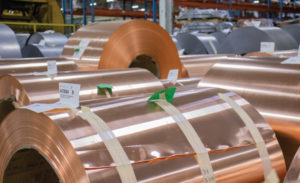Exactly How Copper Products Contribute to Sustainable Practices in Numerous Fields
Copper items are significantly acknowledged for their considerable contributions to lasting practices across numerous markets, driven by their inherent homes such as recyclability, effectiveness, and resilience. In renewable power systems, for instance, copper enhances the performance of solar and wind technologies, while its application in building and construction minimizes waste through long life. Moreover, the material's antimicrobial features supply appealing benefits in healthcare setups. As markets seek to adopt more lasting practices, the function of copper can show pivotal in achieving environmental goals. What effects might this have for future developments in sustainability?
Copper in Renewable Energy
Copper plays a critical duty in the development of renewable resource innovations, working as a crucial conductor in numerous applications. Its remarkable electrical conductivity and resistance to deterioration make it an optimal material for electric wiring, which is vital in solar panels, wind generators, and power storage systems. In solar photovoltaic systems, copper is used in the interconnections and circuitry, making it possible for efficient energy conversion from sunlight to electricity.
In wind power, copper is important to the generators and transformers that transform kinetic energy right into electrical energy, guaranteeing optimum efficiency and integrity. The demand for electric lorries (EVs) is increasing, with copper being a crucial element in batteries, motors, and charging framework. The transition to EVs substantially enhances the demand for copper, as these cars generally use four times a lot more copper than traditional internal burning engine cars.
As the globe seeks to mitigate climate modification and change to lasting power resources, copper's role comes to be progressively critical. The product not just boosts the effectiveness and sturdiness of renewable resource systems however additionally sustains the broader objective of lowering greenhouse gas emissions and advertising a lasting future.
Eco-Friendly Building Products
In the last few years, there has actually been a notable shift towards the fostering of environment-friendly building materials in reaction to expanding ecological worries. This modification is inspired by the need for sustainable choices that decrease ecological impacts while keeping structural honesty and visual charm.
Copper, understood for its durability and recyclability, has actually become an essential gamer in this market. It can be made use of in roofing, plumbing, and electric systems, contributing to energy effectiveness and minimizing waste. Copper's longevity suggests less replacements in time, additional enhancing its sustainability profile.
Furthermore, materials such as bamboo, reclaimed timber, and recycled steel are acquiring popularity. These choices not just offer reduced ecological impact but likewise advertise resource preservation. As developing codes significantly highlight sustainability, contractors and architects are integrating these products into their jobs, promoting innovation in design.
The raising adoption of eco-friendly construction materials shows a broader commitment to sustainability in the built environment. By focusing on these products, the building and construction market can considerably reduce its carbon footprint, line up with regulative requirements, and support a healthier community for future generations. This trend notes a pivotal action towards an extra lasting future in construction.
Copper's Function in Medical care
Recent studies have highlighted the significant role of copper in medical care setups, specifically because of its antimicrobial residential properties. Copper surfaces have actually been revealed to reduce the presence of pathogens, consisting of infections and germs, by up sites to 99.9% within a short duration. This remarkable efficiency makes copper an important material for high-touch surface areas in health centers, such as doorknobs, bed rails, and IV posts, consequently adding to boosted infection control measures.
Along with its straight antimicrobial effects, copper likewise plays a duty in the broader context of healthcare facility sustainability (Copper Products). By including copper right into clinical equipment and furnishings, healthcare centers can decrease the incidence of healthcare-associated infections (HAIs), which not only improves person results but likewise lowers the costs related to extended medical facility stays and added treatments
Additionally, copper's durability and recyclability line up with sustainable techniques, enabling liable resource administration. As healthcare systems significantly prioritize both person security and ecological stewardship, the assimilation of copper products is coming to be a lot more common. This dual advantage highlights copper's crucial payment to a healthier, much safer, and more sustainable healthcare setting.
Sustainability in Transport

Furthermore, copper's longevity and deterioration resistance add to the durability of transportation infrastructure (Copper Products). In rail systems, for circumstances, copper elements boost the dependability and effectiveness of signaling and power systems, vital for reducing hold-ups and power usage. Furthermore, copper's function in renewable resource systems, such as solar and wind, sustains sustainable transportation options by giving tidy power for electrical transit choices
Investments in copper modern technology not just foster sustainability however also boost financial development and job development in eco-friendly industries. As sectors strive to meet strict environmental laws, the application of copper items in transportation emerges as a pivotal strategy in achieving sustainability objectives and advertising a cleaner, more reliable future.
Copper and Circular Economic Climate
As the world significantly accepts sustainability, the role of copper in the circular economic climate becomes ever before a lot more considerable. Copper's innate residential or click to find out more commercial properties-- such as its recyclability, toughness, and conductivity-- placement it as a key material in a resource-efficient economic climate. i thought about this The circular economic situation aims to lessen waste and take full advantage of resource usage through recycling and reusing materials, and copper master this respect.
The steel can be recycled indefinitely without loss of high quality, making it a suitable candidate for lasting methods across different industries, consisting of building and construction, electronics, and renewable resource. By recuperating and reprocessing copper from end-of-life items, markets can significantly minimize the requirement for virgin products, consequently decreasing environmental effects related to mining and processing.
Additionally, the combination of copper into round economy frameworks not just conserves resources but additionally promotes innovation. Services that focus on copper recycling add to a more sustainable supply chain, boosting their competition while lining up with governing needs and consumer preferences for environmentally responsible items.
Conclusion
In final thought, copper products significantly contribute to lasting techniques throughout multiple industries. Their essential function in improving renewable resource technologies, advertising environment-friendly construction materials, sustaining infection control in healthcare, helping with lasting transportation, and personifying the concepts of a round economic situation underscores the adaptability and importance of copper. By integrating copper into numerous applications, sectors can attain better efficiency, minimize ecological effect, and line up with global sustainability objectives, ultimately promoting a much more sustainable future.

Copper's superb conductivity makes it a preferred product in electrical car (EV) systems, boosting power performance and performance. Additionally, copper's role in sustainable power systems, such as solar and wind, supports lasting transportation services by giving clean power for electric transit choices.
Their crucial role in enhancing sustainable energy technologies, promoting environmentally friendly construction products, sustaining infection control in health care, facilitating lasting transport, and personifying the principles of a round economic situation emphasizes the flexibility and significance of copper.